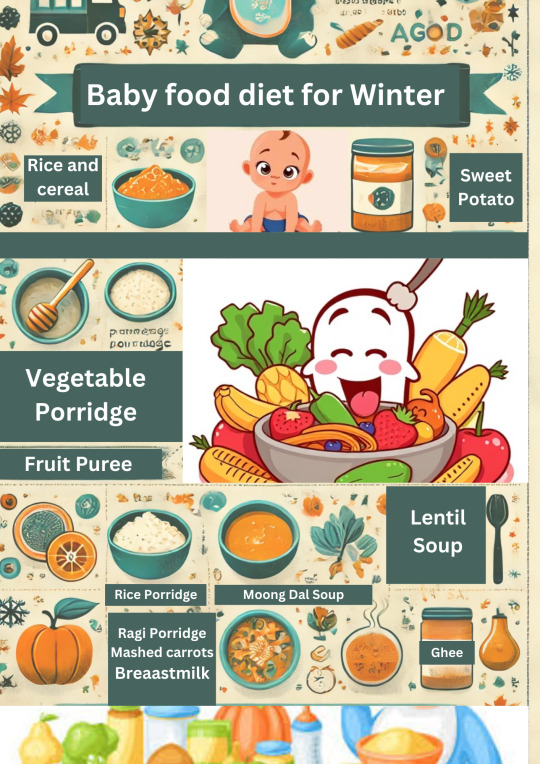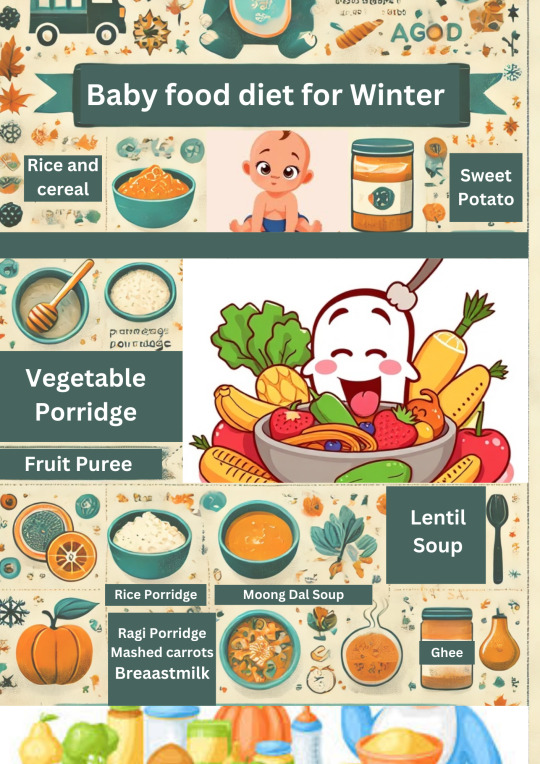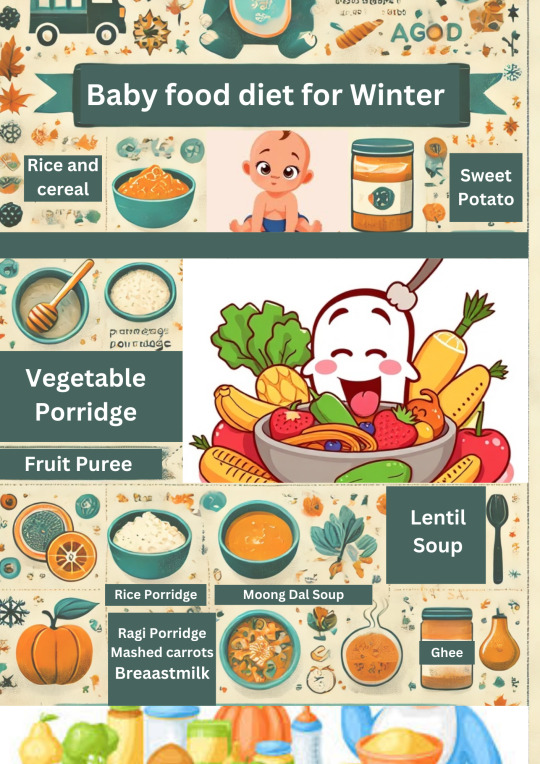Don't wanna be here? Send us removal request.
Text
The Ultimate Guide to a Balanced Baby Food Diet for Your 1-Year-Old
Reaching your baby’s first birthday is an exciting moment, and it’s often accompanied by changes in their diet! At this age, your toddler is ready to explore a variety of nutritious foods while still getting the essential nutrients required for their growth and development. In this guide, we’ll provide a detailed diet plan, complete with meal ideas, tips, and a daily schedule tailored for a 1-year-old.
Why a Balanced Diet Is Important for Your 1-Year-Old
Your child’s nutritional needs change significantly at this stage. A balanced mix of carbohydrates, proteins, fats, vitamins, and minerals is crucial for:
Enhancing brain development
Supporting physical growth
Boosting immunity
Introducing a diverse range of foods helps establish healthy eating habits early on while meeting all their nutritional requirements. Learn more about the benefits of a Baby Food Diet for supporting your little one’s growth.
Essential Nutrients for Your 1-Year-Old
Nutrient
Benefits
Food Sources
Iron
Supports brain development and prevents anemia.
Fortified cereals, beans, lentils, lean meats
Calcium & Vitamin D
Essential for strong bones and teeth.
Whole milk, cheese, yogurt, fortified plant-based milks
Healthy Fats
Necessary for brain growth.
Avocado, nut butters, fatty fish like salmon
Fiber
Aids digestion.
Fruits, vegetables, whole grains
Sample Daily Meal Plan for a 1-Year-Old
Here’s a simple and nutritious meal plan for your toddler:
Breakfast
Scrambled eggs or oatmeal topped with mashed bananas and cinnamon.
A small cup of whole milk or water.
Mid-Morning Snack
Cubed cheese and soft fruit slices like ripe mango or pear.
Lunch
Small portions of grilled chicken or lentils with steamed veggies like peas and carrots.
A side of mashed sweet potatoes or rice.
Afternoon Snack
Whole-grain crackers paired with hummus or a light layer of peanut butter.
Dinner
Mini pasta with a vegetable-rich tomato sauce and a sprinkle of grated cheese.
Steamed broccoli florets or cucumber slices.
Before Bedtime
A small serving of yogurt or warm milk.
Helpful Feeding Tips for a 1-Year-Old
Encourage Self-Feeding: Offer finger foods to let your baby practice eating independently. This supports motor skill development.
Introduce New Foods Gradually: Observe for any signs of allergies when introducing new ingredients.
Avoid Added Sugar and Salt: Stick to naturally flavored foods to maintain a healthy diet.
Handle Picky Eating Patiently: It’s normal for toddlers to be selective. Continue to offer variety without forcing them.
Stay Hydrated: Ensure your child drinks water throughout the day, especially with meals.
Foods to Avoid in a Baby Food Diet
Foods to Avoid
Why They Should Be Avoided
Honey
Can cause botulism in children under 1 year old.
Whole Nuts
Choking hazard; use nut butters instead.
High-Sodium Foods
Processed snacks with added salt.
Sugary Foods
Avoid candy and sodas to prevent tooth decay.
Raw Foods
Ensure meats, fish, and eggs are fully cooked.
Quick and Easy Baby Food Recipes
1. Banana and Avocado Mash
Ingredients: 1 ripe banana, 1/2 avocado
Instructions: Mash the banana and avocado until smooth. Serve as a nutritious snack or side dish.
2. Mini Veggie Pancakes
Ingredients: 1 grated zucchini, 1 grated carrot, 1 egg, 2 tbsp flour
Instructions: Mix the ingredients, then cook small spoonfuls in a hot skillet until golden brown.
3. Yogurt Parfait
Ingredients: Plain yogurt, mashed berries, crushed graham crackers
Instructions: Layer the yogurt, berries, and crackers in a small cup for a quick, delicious treat.
Final Thoughts
Feeding your 1-year-old can be an enjoyable journey as they explore new tastes and textures. By providing a diverse Baby Food Diet, you’re helping them build a solid foundation for healthy eating habits that will last a lifetime. Remember, every child is unique, so be flexible and enjoy the process!
0 notes
Text
The Ultimate Guide to a Balanced Baby Food Diet for Your 1-Year-Old
Reaching your baby’s first birthday is an exciting moment, and it’s often accompanied by changes in their diet! At this age, your toddler is ready to explore a variety of nutritious foods while still getting the essential nutrients required for their growth and development. In this guide, we’ll provide a detailed diet plan, complete with meal ideas, tips, and a daily schedule tailored for a 1-year-old.
Why a Balanced Diet Is Important for Your 1-Year-Old
Your child’s nutritional needs change significantly at this stage. A balanced mix of carbohydrates, proteins, fats, vitamins, and minerals is crucial for:
Enhancing brain development
Supporting physical growth
Boosting immunity
Introducing a diverse range of foods helps establish healthy eating habits early on while meeting all their nutritional requirements. Learn more about the benefits of a Baby Food Diet for supporting your little one’s growth.
Essential Nutrients for Your 1-Year-Old
Iron
Supports brain development and prevents anemia.
Fortified cereals, beans, lentils, lean meats
Calcium & Vitamin D
Essential for strong bones and teeth.
Whole milk, cheese, yogurt, fortified plant-based milks
Healthy Fats
Necessary for brain growth.
Avocado, nut butters, fatty fish like salmon
Fiber
Aids digestion.
Fruits, vegetables, whole grains
Sample Daily Meal Plan for a 1-Year-Old
Here’s a simple and nutritious meal plan for your toddler:
Breakfast
Scrambled eggs or oatmeal topped with mashed bananas and cinnamon.
A small cup of whole milk or water.
Mid-Morning Snack
Cubed cheese and soft fruit slices like ripe mango or pear.
Lunch
Small portions of grilled chicken or lentils with steamed veggies like peas and carrots.
A side of mashed sweet potatoes or rice.
Afternoon Snack
Whole-grain crackers paired with hummus or a light layer of peanut butter.
Dinner
Mini pasta with a vegetable-rich tomato sauce and a sprinkle of grated cheese.
Steamed broccoli florets or cucumber slices.
Before Bedtime
A small serving of yogurt or warm milk.
Helpful Feeding Tips for a 1-Year-Old
Encourage Self-Feeding: Offer finger foods to let your baby practice eating independently. This supports motor skill development.
Introduce New Foods Gradually: Observe for any signs of allergies when introducing new ingredients.
Avoid Added Sugar and Salt: Stick to naturally flavored foods to maintain a healthy diet.
Handle Picky Eating Patiently: It’s normal for toddlers to be selective. Continue to offer variety without forcing them.
Stay Hydrated: Ensure your child drinks water throughout the day, especially with meals.
Foods to Avoid in a Baby Food Diet
Honey
Can cause botulism in children under 1 year old.
Whole Nuts
Choking hazard; use nut butters instead.
High-Sodium Foods
Processed snacks with added salt.
Sugary Foods
Avoid candy and sodas to prevent tooth decay.
Raw Foods
Ensure meats, fish, and eggs are fully cooked.
Quick and Easy Baby Food Recipes
1. Banana and Avocado Mash
Ingredients: 1 ripe banana, 1/2 avocado
Instructions: Mash the banana and avocado until smooth. Serve as a nutritious snack or side dish.
2. Mini Veggie Pancakes
Ingredients: 1 grated zucchini, 1 grated carrot, 1 egg, 2 tbsp flour
Instructions: Mix the ingredients, then cook small spoonfuls in a hot skillet until golden brown.
3. Yogurt Parfait
Ingredients: Plain yogurt, mashed berries, crushed graham crackers
Instructions: Layer the yogurt, berries, and crackers in a small cup for a quick, delicious treat.
Final Thoughts
Feeding your 1-year-old can be an enjoyable journey as they explore new tastes and textures. By providing a diverse Baby Food Diet, you’re helping them build a solid foundation for healthy eating habits that will last a lifetime. Remember, every child is unique, so be flexible and enjoy the process!
0 notes
Text
Winter Diet Guide for 6-Month-Old Babies
As winter arrives, parents often struggle with deciding what foods are best for their 6-month-old babies. At this stage, babies transition from breastfeeding or formula to solid foods, which is a crucial time for their development. A nutritious winter diet will not only support their growth but also help strengthen their immune system against the cold weather. In this blog post, we’ll provide a detailed food plan for 6-month-old babies during the winter months to ensure they stay healthy and happy.
The Significance of a Proper Diet
At 6 months old, a baby’s digestive system is still maturing, so introducing solids gradually is important. With the added challenge of winter illnesses, a well-planned diet is necessary for:
Proper nutrition to promote growth and development.
Strengthened immunity to combat common winter ailments.
A smooth transition to new food textures and flavors.
Learn more about creating the perfect baby food diet for your baby.
The Role of Breastfeeding or Formula Feeding
Even though you’re introducing solid foods, breastfeeding or formula feeding should remain the primary source of nutrition. Breast milk and formula are packed with vital nutrients, antibodies, and warmth, which protect your baby during the cold weather.
Best Foods for 6-Month-Old Babies During Winter
When planning a baby food diet, focus on foods that are easy to digest, full of nutrients, and provide warmth. Here are some great choices:
1. Warm Porridges
Rice Cereal: Mashed rice cereal is gentle on your baby’s stomach and provides essential carbohydrates.
Ragi (Finger Millet) Porridge: Ragi is high in calcium and iron, making it ideal for keeping your baby warm during winter. You can cook it with water or breast milk for extra nutrition.
2. Vegetable Purees
Start with purees of carrots, sweet potatoes, or pumpkin. These vegetables are full of vitamins and antioxidants that help boost immunity.
Ensure that the vegetables are steamed or boiled, then pureed into a smooth consistency for easy digestion.
3. Winter Fruits
Apples and pears are perfect for winter. Steaming and mashing them into a puree makes them easier for your baby to digest.
Bananas, although available all year, are also a great source of energy. Serve them at room temperature.
4. Lentil Soup
Strained lentil soup is protein-rich, warming, and easy on the stomach. Avoid adding salt or spices during this stage.
5. Ghee
A few drops of ghee can be added to porridges or purees. Ghee is a good source of healthy fats and helps keep your baby warm.
6. Herbs and Spices
A small pinch of nutmeg or cardamom can be added to meals for warmth and flavor. These spices are known for aiding digestion and boosting immunity.
Tips for Preparing Winter Meals
Fresh Ingredients: Always use fresh, seasonal produce.
Cleanliness: Ensure all utensils and ingredients are clean to prevent infections.
Serve Warm: Serve food at a lukewarm temperature to keep your baby comfortable.
Introduce Foods Slowly: Introduce one new food at a time to monitor for allergies.
Sample Winter Meal Plan for a 6-Month-Old Baby
Here’s a sample meal plan to follow:
Morning: Breast milk or formula feeding.
Mid-Morning: Apple or pear puree.
Lunch: Rice cereal or ragi porridge.
Afternoon: Breast milk or formula feeding.
Evening: Vegetable puree (carrot or sweet potato).
Night: Breast milk or formula feeding.
Foods to Avoid in Winter
When planning a baby food diet, be mindful of the following foods:
Citrus Fruits: Acidic fruits like oranges may upset your baby’s stomach.
Honey: Honey can cause botulism in babies under one year.
Raw Foods: Always cook and mash foods for easy digestion.
Cold Foods: Avoid giving food directly from the fridge.
How to Know When Your Baby is Ready for Solids
Before you start solids, make sure your baby shows these signs:
Can sit up with minimal support.
Shows interest in food during mealtime.
Has lost the tongue-thrust reflex (spitting out food).
Monitoring Your Baby’s Health
Watch for any changes in your baby’s response to new foods, such as:
Digestive issues like constipation or diarrhea.
Skin rashes or allergic reactions.
Changes in appetite.
If any of these occur, stop the new food and consult your pediatrician.
More Resources
Planning a baby food diet can seem overwhelming, especially in the winter. For more tips on nutrition and recipes, check out the website for helpful resources. The site offers practical advice to make mealtime easier and more enjoyable.
Final Thoughts
A well-balanced diet is crucial for your baby’s growth, particularly during the colder months. By introducing warm, nutritious foods, you can help your baby stay healthy, grow strong, and make the most of their first winter. With careful planning and attention, you can ensure your 6-month-old enjoys a healthy start. Explore more tips and recipes on babyfooddiet.in to guide you through this exciting stage of your baby’s development.
1 note
·
View note


